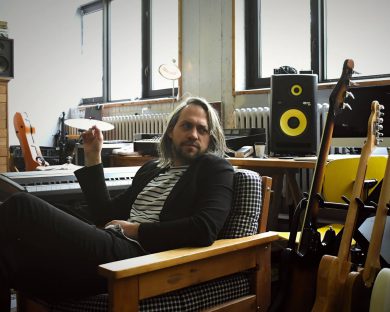There were flowers that weren’t allowed to grow. Singer-songwriter Antoine Corriveau re-thinks the places where things grow, the homes where people live, and the opportunities we give culture to bloom, even as we’re conscious of the end.
His fourth album Pissenlit (in English, Dandelion), released on Secret City Records on Oct. 9, 2020, was primarily inspired by the cute and naive aspect of the flowers of our youth, which we used to gather large bunches of before we learned that some were less valuable than others. Then the issue of territory and its ownership developed, lending a different colour to dandelions that insist on remaining yellow.
 “From day one, with music, I wanted to try new things. This time, I wanted my upcoming show to be like a freight train that runs over you and stops only two or three times for more introspective moments,” says Corriveau.
“From day one, with music, I wanted to try new things. This time, I wanted my upcoming show to be like a freight train that runs over you and stops only two or three times for more introspective moments,” says Corriveau.
During the final shows of his latest tour, Corriveau performed a punk version of “Noyer le poisson” (Les ombres longues, 2014), and, later on, “La ville d’où on vient” was given the same makeover. The energy emanating from such a show proved to be a source of excitement, if not redemption, for Corriveau and his band. “I didn’t mind having sore arms at the end of the show because I’d played so hard,” he says. “I wanted a full album of that.”
Corriveau locked five drummers inside his Van Horne St. premises and let them improvise together. Only drums. “I ended up with three-and-a-half hours of drumbeats that I started listening to in my car,” he says. “Tracks of nine-to-14-minutes long. These sounds provided me with something solid right there,” he marvels today.
Corriveau’s honesty renews itself, and takes new forms, with each successive album. “I recently re-listened to Cette chose qui cognait au fond de sa poitrine sans vouloir s’arrêter (2016), and I realized that whatever I might do later on would sound very much like pop music to me, because that album was very dark,” he explains.
Corriveau admits that, as he was self-producing his album and dealing with the hazards and opportunities of lockdown, he allowed himself to explore some rather unusual areas of his repertoire. “I let it all happen because there weren’t too many witnesses,” he laughs. “I tried things. Being self-taught, I don’t understand 75 percent of what I do. I piled things up, played around, trusted myself.”
The new album revolves around the theme of the freedom that can be enjoyed by getting out in your car instead of sitting at home. But there’s also a “bandit” side, a rebellion, but mostly the point of no return in what we tolerate as musicians and as a society. “Writing, recording, performing shows, and starting all over again are clichés,” says Corriveau. “My original view of the industry was candid. Like everyone else, I believed that I was going to create a recording that would change everything. I don’t have that kind of career today, and that’s OK.”
When Québec Premier François Legault shut down concert venues for the second time, Corriveau felt that this was the most inconsistent thing he had ever done. “When he claimed that shows were places where people go to socialize, it made me mad, because the truth is that you’re supposed to shut up during a show,” he says. “Saying a thing like that is ignoring what’s happening onstage.”
While the Pissenlit album was designed to be experienced onstage, Corriveau can’t see the end of this very dark period for the performing arts. “I don’t think this crisis will ever end,” he laments.
Erika Angell combines her voice with Corriveau’s on Les sangs mélangés, a song that deals with First Nations issues. “In America, we all have Indian blood, either in our veins, or on our hands,” he sings, against a slow chord that takes time to insinuate the idea, the better to show the seriousness of the situation. Asked what else we should say, or understand, about that as a society, Corriveau seems unable to pinpoint anything.
“It’s in everything,” he says. “This summer, during the wave of sexual aggression denunciations, we suddenly realized that our teenagers are getting five hours of sex education during the school year. The same goes for history classes: 20 minutes on Indigenous peoples, and then, off to the battle of the Plains of Abraham for the rest of the year.”
In his view, they’ve got their priorities all wrong. “It makes no sense that, in a pandemic, our reaction should be to let our cultural institutions be the first ones to die,” he exclaims. “They erase what they’re uncomfortable with, they pull out the weeds. And, if you extrapolate, this idea of erasing what makes you uncomfortable, for some, including the First Nations, this adds up to a death sentence. I realize that the planet is heatng up, that we’re going through a worldwide pandemic, and that we’re all going to die, but it’s still possible for us to look around our own life environment, and make it less bad.”
Perhaps by letting the dandelions grow.